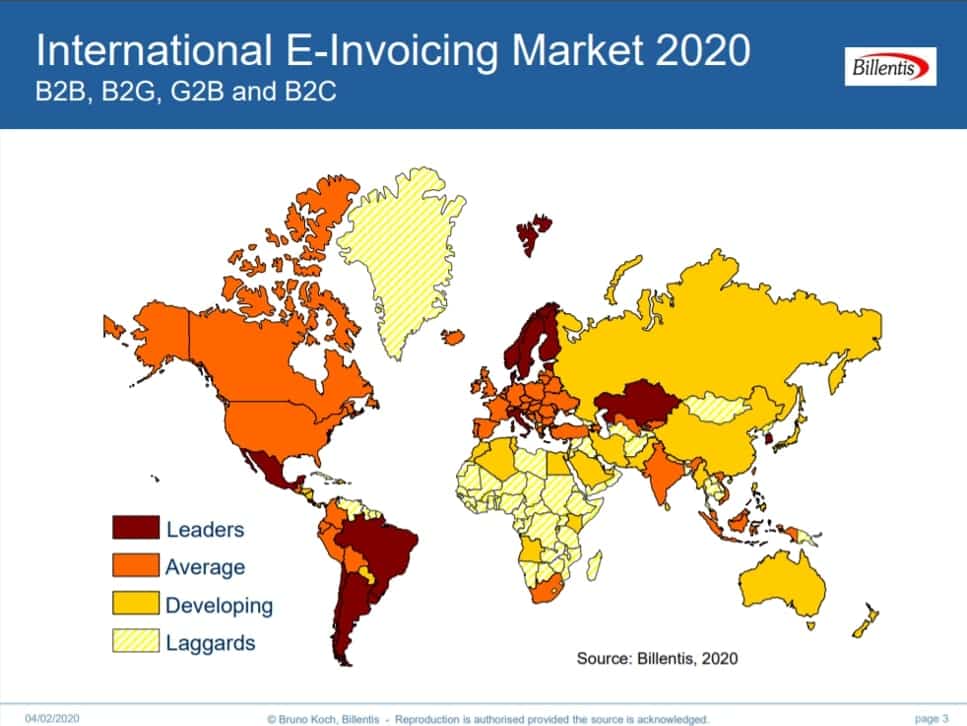- Blog
- Finland’s new e-invoicing mandate and what it means for your global company
Finland’s new e-invoicing mandate and what it means for your global company
Beginning April 1, 2020, the law allows public administrations and private companies to require e-invoices from their suppliers in Finland. This means that if the invoice receiver in Finland so decides, they can refuse and reject e-invoices that are not following the European norm.
Finnish e-invoicing law
Finland has historically been progressive when it comes to electronic invoicing (e-invoicing)—particularly in the business to business (B2B) realm. According to State Treasury website, 92% of invoices exchanged today with the central government are already electronic.
But on April 1, 2020, e-invoicing takes another step forward. It marks the day which all public organisations as well as private companies can require e-invoices from their suppliers in Finland. The law does not prohibit anyone from receiving invoices of different formats, but it does give the buyer the right to reject electronic invoices that do not contain the data fields specified in the Directive 2014/55/EU.
Both Finvoice and Teapps, Finland’s national e-invoicing formats, are updated to version 3.0 to ensure compliance with the European standard and the Finnish tax administration’s VAT tax invoicing requirements.
Further details can be found here: https://www.finlex.fi/fi/laki/alkup/2019/20190241
The main objective of the new Finnish e-invoicing requirement is to enhance public procurement in general and help further develop the active usage of e-invoices. The law also maintains that all public procurement entities and private traders must ensure their ability to send e-invoices that comply with the European Standard if asked.
Other global e-invoicing mandates
Across the globe, countries are turning more and more towards e-invoicing. Why? Because the benefits speak for themselves. E-invoicing drastically reduces the cost of processing an invoice, decreases the likelihood of invoice disputes, eliminates manual entry errors, increase global tax compliance overall, and reduces the reliance on paper processing and therefore, creates a greener more sustainable workplace.


According to a recent Billentis report, here are a few ways other countries are enabling better business by instating e-invoicing laws and regulations.
Europe
-
From April 2020, EU Public Administrations on all federal levels must become e-invoicing and e-procurement ready.
-
There are upcoming business to government (B2G) e-invoicing mandates in Croatia, Estonia, and France.
-
From April 2020, e-invoicing will be required for business in Portugal with companies more than 250 employees. By the end of 2020, all businesses will be required to process invoices electronically.
-
There are planned B2B e-invoicing mandates in Serbia starting in 2022 and France after 2023.
North America
-
The Federal Reserve is encouraging continued efforts to promote electronic invoicing and payments adoption.
-
Aiming to build an e-invoicing interoperability framework for vendors.
Latin America
-
The public sector is actively encouraging electronic tax reporting with Brazil, Mexico, and Chile acting as market leaders.
-
There are active mandates for e-invoicing in a majority of Latin American countries.
-
In 2020, Bolivia, Columbia, and Guatemala are extending e-invoicing mandates to the remaining groups of users.
-
Countries such as Dominican Republic, El Salvador, Honduras, Panama, Paraguay, and Peru are taking steps to prepare for inevitable e-invoicing mandates.
Asia and Pacific Regions
-
From April 2020, electronic invoice registration will be mandatory in India.
-
From November 2020, electronic invoicing will be mandatory in Vietnam.
-
New e-invoicing mandates exist in Kyrgyzstan and Uzbekistan.
-
China is prepared to roll-out business to consumer (B2C) and B2B e-invoicing.
How will this impact suppliers in the EU?
To send e-invoices to Public Sector EN, requirements must be met. The invoice sender must, together with their software vendor, consider two things:
-
What information they need in their billing system and
-
The billing materials they make, to be able to make an invoice that meets EN's requirements.
The EU standard does not obligate suppliers to send e-invoices to the public sector, but there are country-specific differences which are important to understand. For example, in the Nordic countries, the public sector has historically been active in demanding e-invoices from suppliers. Therefore, it is important for suppliers to have a look at the countries they are active within to better understand e-invoicing regulations.
For the time being, the new European standard on e-invoicing remains an opportunity for suppliers to deliver e-invoices to their public sector customers. As a Basware customer, suppliers can send invoices in their own format to all public sector organisations in European countries where Basware supports B2G e-invoicing.
Prepare for the future of e-invoicing with the Basware Network
Being a part of the Basware Network gives you the best opportunity to send and receive e-invoices in Finland and any other country. It delivers the largest open global network, meaning it’s easy to exchange documents with over 1.5 million organisations and more than 220 global networks.
Basware is VAT compliant in over 50 countries, and by joining the Basware Network, your organisation will automatically become part of the PEPPOL network, meaning other businesses can find you in the PEPPOL directory for easy exchange of e-invoices.
To prep your organisation for Finland’s upcoming e-invoicing mandate, feel free to contact us to learn more and discuss your business’ preparedness.
Subscribe to the Basware Blog!
Related
-
By Leigh CelonesTop AP Automation Trends 2026: What Do Finance Teams Need to Prepare for Now?
-
By Olav MaasFrom Bottlenecks to Breakthroughs: Rethink PO Invoice Processing with AI
-
By Christopher BlakeHow To Fix Broken and Disconnected Invoice Processes with Invoice Lifecycle Management
-
By Jon StevensAP First, ERP Next: KION’s Smarter Path to SAP S/4HANA
-
By Jon StevensConnect the Dots Between AP and Your S/4HANA Migration
-
By Leigh CelonesFrom Chaos to Clarity: Rethink Non-PO Invoice Handling with AI
-
By Basware RepresentativeBest Defense Against AP Crime: 6 Proven Measures Webinar
-
By Martti NurminenRethinking Accounts Payable: AI, Compliance & Automation
